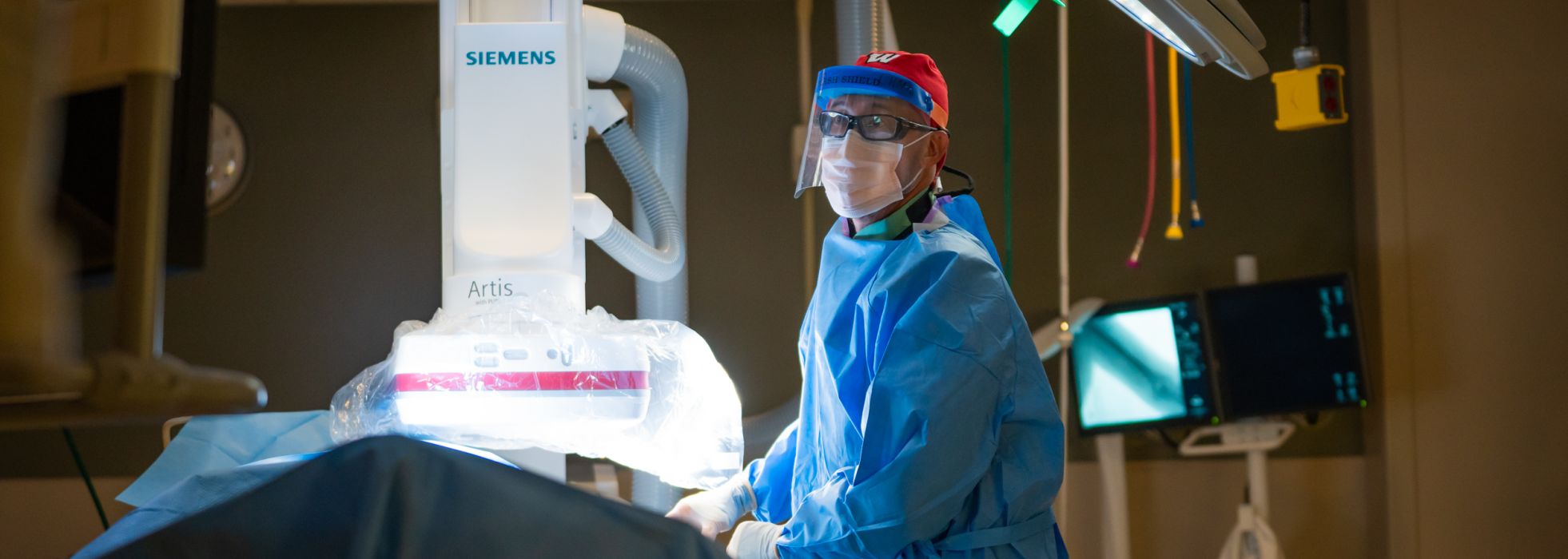About Our Program
The University of Wisconsin interventional nephrology fellowship is widely regarded as the pioneer in interventional nephrology training.
Here, you'll train with national leaders in the field, gain robust clinical experience in one of the nation's top procedure centers, and develop leadership skills in academic medicine.

Meet Our Program Director
“Dialysis access is the lifeline of a dialysis patient. As interventional nephrologists, we perform life-saving procedures for these patients every day.
At UW, we pride ourselves as one of the earliest interventional nephrology training programs in the country. We have introduced innovative technologies, including endovascular AV fistula creation and the Surfacer inside-out catheter system, which places us in a perfect position to remain leaders in the field.”

Why You'll Love Our Program
- Exposure to cutting-edge technologies and techniques
- Balance of service and procedure time ensures clinical skills are maintained
- Robust didactic schedule with highly involved faculty.
- Dedicated one-year program in a high-volume academic center with opportunities to practice in both university and private practice settings
- Opportunity to do research in dialysis access care and present at national meetings
How to Apply
We accept two fellows per year.
Once applications for the 2026-27 fellowship open, they will be accepted on a rolling basis until both positions fill - although to ensure your application is considered, you should submit it by the end of September.
As a part of your application, you will be asked to upload a current CV, personal statement (cover letter), and three references; one of your references must be the Program Director of your general nephrology fellowship program.
You will also be expected to upload your current CV, a cover letter (personal statement) and a list of three references from individuals that would be able to complete a questionnaire or provide a letter of recommendation for you; one of your references should be your Nephrology Fellowship Program Director.
For more information, please contact:
Derek Strom
Program Manager
Current Fellows
Medical School: American University of Antigua College of Medicine
Residency: The Brooklyn Hospital Center
General Nephrology Fellowship: Temple University Hospital
Medical School: American University of Antigua College of Medicine
Residency: University of Maryland Capital Region Health
General Nephrology Fellowship: SUNY Upstate Medical University Hospital
Graduate Success
University of Wisconsin interventional nephrology fellowship graduates have gone on to outstanding careers in both academic and private settings. Several have successfully established new vascular access programs in their practices.
Administrative Staff
Program Manager
Primary contact for questions, concerns and training verifications.
Leadership
Program Director
Curriculum
Our fellowship offers exceptionally comprehensive, non-discriminatory, and nationally renowned training that has produced outstanding interventional nephrologists in both the public and private sectors.
As a fellow, you'll gain one year of clinical experience at one of the top procedure centers, and also teach other learners. You'll be prepared to work effectively as a general and interventional nephrologist in your future career.

Experiences and Procedures
Didactic Experiences
You'll have access to all general nephrology didactics and conferences, plus these didactic sessions and teaching methods:
- Teaching Interventionalist lecture series (weekly)
- Journal Club (quarterly)
- Vascular access care conference/M&M (monthly)
- Procedural teaching (daily)
Clinical Procedure Requirements
- 100 angiograms
- 100 angioplasties
- 100 tunneled catheters
- 25 PD catheters
- 25 thrombectomies
- 10 native biopsies (may transfer from previous program)
- 10 transplant biopsies (may transfer from previous program)
Scholarly Activity
- Research. You'll conduct research with interventional nephrology faculty in dialysis access care. You are expected to present abstracts at national meetings and to publish manuscripts in peer-reviewed journals.
- Teaching. You'll have the opportunity to teach general nephrology fellows, medical students and internal medicine residents who rotate with Nephrology throughout the year. You may also choose to lead small and medium group discussions as a part of the medical school’s renal course each year.
- Educator Development. The Department of Medicine's Fellow Medical Education (FAME) Training Track trains fellows to become effective clinician-teachers and scholars.
Mentoring
Fellows are mentored by the program director and by Micah Chan, MD, a nationally renowned leader in interventional nephrology.
Aims and Accreditation
- Aims
-
At the end of the training year, fellows will be able to:
- Demonstrate expertise in vascular access management
- Demonstrate expertise with all endovascular procedures involving dialysis vascular access
- Understand the potential complications that can occur with endovascular procedures and how to effectively manage them
- Understand the techniques available to implant a PD catheter
- Understand and manage potential complications of PD catheter placement
- Understand the basic elements and operation of ultrasonography equipment
- Understand how to perform venous mapping
- Demonstrate the ability to perform native or transplant kidney biopsy
- Understand how to perform kidney, bladder, and urinary system ultrasound
- Understand the concept of endovascular AV fistula creation, patient screening and post procedure maturation process.
- Understand basic radiation physics
- Understand the effects of radiation exposure and the methods to decrease risk
- Become familiar with radiation monitoring
- Understand the operation of fluoroscopy equipment
- Understand the principles of epidemiology and clinical research design
- Be able to apply research to clinical practice
- Understand the principles of biostatistics in research
- Understand the principles of ethics in research
- Understand all aspects of office and personnel management
- Be familiar with medical insurance and reimbursement
- Excel at billing and coding interventional nephrology procedures
- Demonstrate the ability to independently manage an outpatient vascular access center
The program is accredited by the American Society of Diagnostic and Interventional Nephrology (ASDIN). At the end of their training, fellows have enough experience to receive ASDIN certification in both hemodialysis vascular access procedures and peritoneal dialysis catheter placement.





